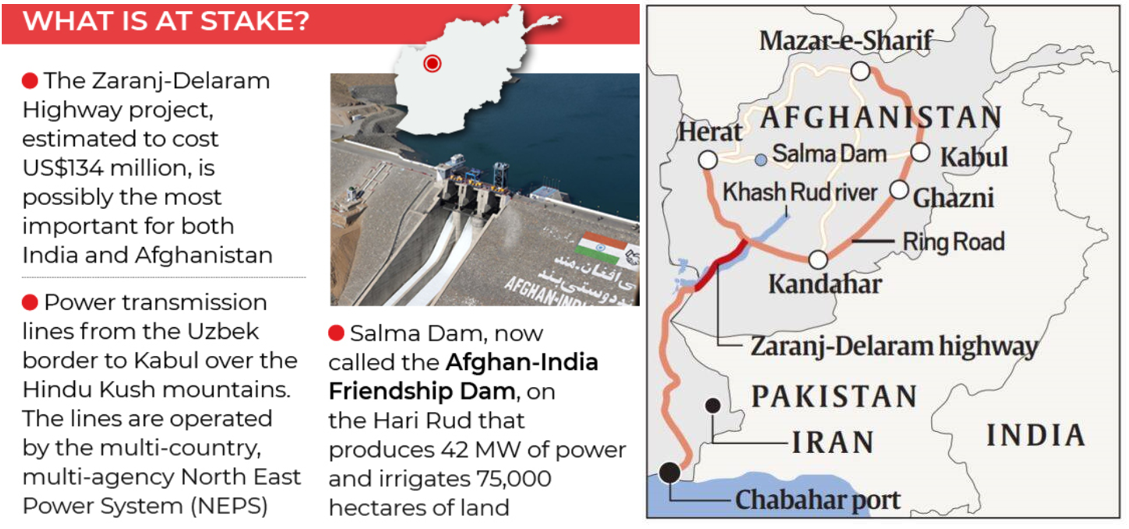[ad_1]

Context:
With the withdrawal of the United States from Afghanistan in process, Indian government has decided to ramp down its civilian presence in the war-torn country, bracing for a full-blown civil war.
India has ‘temporarily’ closed its consulate in Kandahar and evacuated its diplomats and Indo-Tibetan Border Police (ITBP) personnel stationed there.
This follows the decision to suspend operations in the Indian consulates in Jalalabad and Herat.
As a result, India today is left with its Embassy in Kabul and the consulate in Mazar-e-Sharif.
India’s developmental works in Afghanistan:
- India built vital roads, dams, electricity transmission lines and substations, schools and hospitals, etc.
- The 2011 India-Afghanistan Strategic Partnership Agreement recommitted Indian assistance to help rebuild Afghanistan’s infrastructure and institutions, education and technical assistance for capacity-building in many areas, encourage investment in Afghanistan and provide duty-free access to the Indian market. Bilateral trade is now worth $1 billion.
- India’s development assistance is now estimated to be worth well over $3 billion. And unlike in other countries where India’s infrastructure projects have barely got off the ground or are mired in the host nation’s politics, it has delivered in Afghanistan.
- Last year, India pledged $1 million for another Aga Khan heritage project, the restoration of the Bala Hissar Fort south of Kabul, whose origins go back to the 6th century.
- Bala Hissar went on to become a significant Mughal fort, parts of it were rebuilt by Jahangir, and it was used as a residence by Shah Jahan.
Bilateral trade relations between India-Afghanistan:
- Despite the denial of an overland route by Pakistan, India-Afghanistan trade has grown with the establishment in 2017 of an air freight corridors.
- In 2019-20, bilateral trade crossed $1.3 billion, Afghan government officials said at a recent interaction with Indian exporters in Mumbai.
- The balance of trade is heavily tilted exports from India are worth approximately $900 million, while Afghanistan’s exports to India are about $500 million.
- Afghan exports are mainly fresh and dried fruit. Some of this comes overland through the Wagah border, Pakistan has permitted Afghan trade with India through its territory.
- Indian exports to Afghanistan take place mainly through government-to-government contracts with Indian companies.
- Exports include pharmaceuticals, medical equipment, computers and related materials, cement, and sugar.
- Two air corridors — Kabul-Delhi and Herat-Delhi — are in operation now. Trade through Chabahar started in 2017 but is restricted by the absence of connectivity from the port to the Afghan border. Trade volumes are minuscule.
India-Taliban attempts for talk:
- India’s tentative and belated attempts to reach out to the Taliban have not yielded the desired results.
- India’s decision to pull out Indian nationals from its diplomatic outpost in Kandahar indicated it had failed to get from the Taliban, either directly or through interlocutors, even the minimum assurance of safety for its personnel at the consulate.
- It is debatable if India should be making the effort to make contact at all with such a group, or, alternatively, if it should have done so earlier, at the time when the Trump administration launched serious efforts at negotiations with the group, back in 2017.
- But then, India appeared to believe that the Americans would never leave, and was also misled by the Blinken plan that urged a regional consensus in Afghanistan under the auspices of the United Nations. But all this is academic now.
Need to Reset Afghanistan policy:
- India’s Afghan policy is at a major crossroads; to safeguard its civilian assets there as well as to stay relevant in the unfolding ‘great game’ in and around Afghanistan, India must fundamentally reset its Afghanistan policy.
- India must, in its own national interest, begin ‘open talks’ with the Taliban before it is too late. The time for hesitant, half-embarrassed backchannel parleys is over.
- Author suggested that, it is time to ‘openly’ talk to the Taliban, however, it does not mean according recognition to the Taliban.
- It is only one of the parties in Afghanistan, it is neither the Afghan government, nor a part of it. Not yet.
- But with over a third of Afghanistan’s more than 400 districts under Taliban control, the talk-to-the-Taliban-option is indeed the best of the many less than perfect options available to India.
- If India is not proactive in Afghanistan at least now, late as it is, Russia, Iran, Pakistan and China will emerge as the shapers of Afghanistan’s political and geopolitical destiny, which for sure will be detrimental to Indian interests
Way Ahead:
- Open dialogue with the Taliban should no longer be a taboo; it is a strategic necessity. Therefore, our outreach must now be direct and unambiguous.
- Perhaps most importantly, opening up the congested north-western frontier is key to bringing India’s continental grand strategy on an even keel, a process India has already started.
- Backchannel talks with Pakistan and a consequent ceasefire on the Line of Control, political dialogue with the mainstream Kashmiri leadership, secret parleys with Taliban all indicate that India is opening up its congested north-western frontier.
- Proactive engagement of the Taliban will provide this effort with more strategic heft.
Conclusion:
As the Russian deputy envoy to Delhi has been quoted as saying, the Taliban are the current reality of Afghanistan, and it is for India to decide what role it wants to play.
Much hope is being set on the Doha talks between the Taliban and representatives of the Afghan government.
But even on the outside chance that these “intra-Afghan” talks might lead to a political resolution, the Taliban, with their military ascendancy, are likely to call the shots in a future dispensation.
As author mentioned it is time for India to engage the Taliban to secure its interests.
India also needs to reassess its policy choices in close coordination with Russia and Iran, constantly reminding them that complete surrender to the Taliban’s demands will be detrimental to their own security.
[ad_2]

